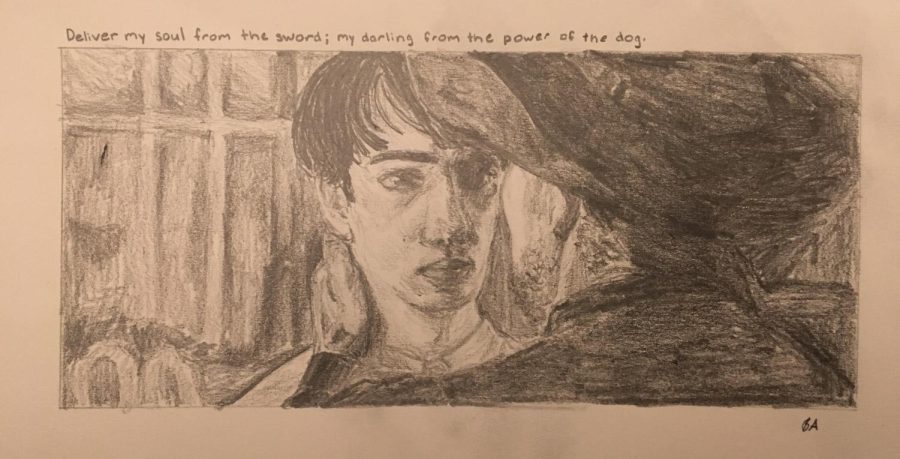The Power of the Dog: A Fetching Tale
March 8, 2022
Rating: 5/5 Falcons
“When my father passed, I wanted nothing more than my mother’s happiness,” says Peter Gordon in the opening line of The Power of the Dog. “For what kind of man would I be, if I did not help my mother? If I did not save her?” This foreshadows the adversity faced by Peter’s mother in the Western-romance-thriller movie, The Power of the Dog. Set in 1920s Montana and starring Benedict Cumberbatch, Kirsten Dunst, Jesse Plemons, and Kodi Smit-McPhee, the film transcends genres, emerging as a work of art that will blow your mind.
Rancher brothers Phil (Benedict Cumberbatch) and George Burbank (Jesse Plemons) are complete opposites;Phil is disheveled and cruel while George is polished and kind. The story begins when the brothers stop at an inn with their cattle and cowhands. The innkeeper, widow Rose Gordon (Kristen Dunst) and her effeminate son Peter (Kodi Smit-McKee), serve the guests dinner. Phil laughs at Peter for his feminine characteristics andGeorge does not laugh; he hears Rose crying and apologizes for his brother’s behavior. The plot thickens when George falls in love with Rose, and she moves in with the brothers. Phil continues to cruelly mock her family, pushing Rose to a problematic dependency on alcohol. Peter’s reluctant agreement to join his mother at the Burbank’s ranch (an ode to Peter’s opening line) leads to an unexpected bond between Phil and Peter.
Furthermore, The cinematography in The Power of the Dog is otherworldly. This is obvious right from the opening scene: a closeup shot of ranch animals running amidst beige puffs of dust. Through a stunning wide shot that likely pays tribute to the iconic doorway image in The Searchers, Phil Burbank’s personality is heavily disclosed. As he assuredly walks past dimly-lit houses, Phils’ tall dirt-caked body emphasizes his masculinity. The dark lighting and photography of the scene further emphasize his intensity. It is cinematic gold.
Another excellent aspect of this movie is the costume design. Phil can be spotted twice swimming alone in rivers naked, a costume choice made to contrast George’s white-collar suits, formal shirts, and suspenders. During his swims, Phil rubs mud all over his body in a feral animalistic manner that is synonymous with his personality. However, the most interesting character to study costume-wise is Rose. As her alcohol addiction increases, so does her lack of social awareness. She wears flimsy nightgowns in public more than she wears normal clothes. This costume change is intentional; it demonstrates her journey of losing herself.
Many aspects of this film stand out. However, the reason it deserves a full 5/5 Falcons is due to its intricate storyline and clever plot twist. The ending is shocking and makes the viewer want to rewatch the movie to notice the clues. The characters are brilliant because they are atypical. Every single character in the film is flawed, the nice woman is an alcoholic, the sweet son kills rabbits for fun, the kind husband is never around, and the admirable protagonist has anger issues. They are all deeply imperfect. Doesn’t that make a great movie?
This piece also appears in our February 2022 print edition.










